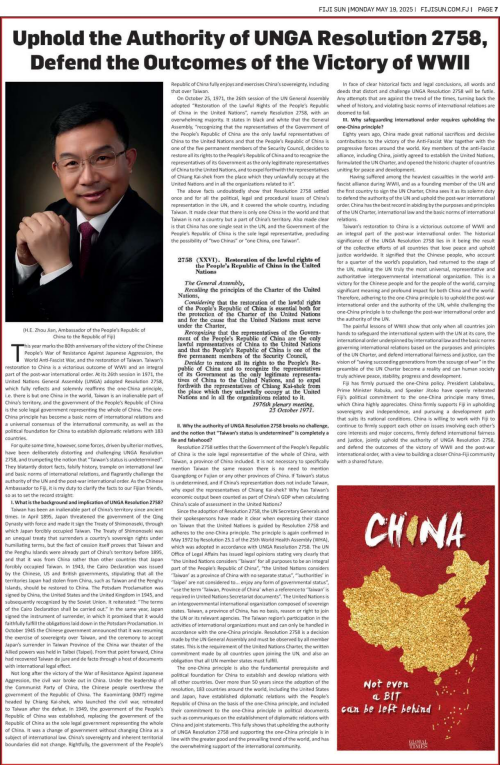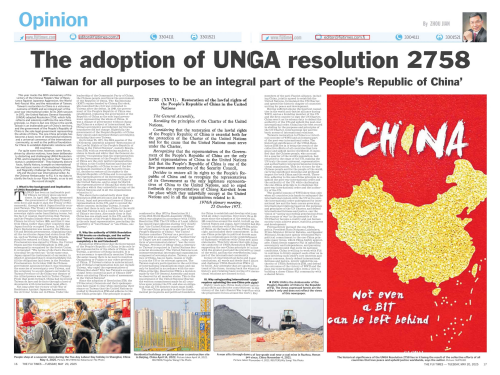
People’s Republic of China


On May 19 and 20, Ambassador Zhou Jian published a signed article titled "Uphold the Authority of UNGA Resolution 2758, Defend the Outcomes of the Victory of WWII" on Fiji Sun and The Fiji Times, mainstream newspapers in Fiji. The article deeply explained the Taiwan question with historical facts, and fully demonstrated the one-China principle. It refuted the fallacy of "undetermined status of Taiwan", and called on the international community to jointly uphold the authority of UNGA Resolution 2758, defend the outcomes of victory in WWII, and safeguard the post-war international order. The full text is as follows:

This year marks the 80th anniversary of the victory of the Chinese People's War of Resistance Against Japanese Aggression, the World Anti-Fascist War, and the restoration of Taiwan. Taiwan's restoration to China is a victorious outcome of WWII and an integral part of the post-war international order. At its 26th session in 1971, the United Nations General Assembly (UNGA) adopted Resolution 2758, which fully reflects and solemnly reaffirms the one-China principle, i.e. there is but one China in the world, Taiwan is an inalienable part of China's territory, and the government of the People's Republic of China is the sole legal government representing the whole of China. The one-China principle has become a basic norm of international relations and a universal consensus of the international community, as well as the political foundation for China to establish diplomatic relations with 183 countries.
For quite some time, however, some forces, driven by ulterior motives, have been deliberately distorting and challenging UNGA Resolution 2758, and trumpeting the notion that "Taiwan's status is undetermined". They blatantly distort facts, falsify history, trample on international law and basic norms of international relations, and flagrantly challenge the authority of the UN and the post-war international order. As the Chinese Ambassador to Fiji, it is my duty to clarify the facts to our Fijian friends, so as to set the record straight:
I. What is the background and implication of UNGA Resolution 2758?
Taiwan has been an inalienable part of China's territory since ancient times. In April 1895, Japan threatened the government of the Qing Dynasty with force and made it sign the Treaty of Shimonoseki, through which Japan forcibly occupied Taiwan. The Treaty of Shimonoseki was an unequal treaty that surrenders a country's sovereign rights under humiliating terms, but the fact of cession itself proves that Taiwan and the Penghu Islands were already part of China's territory before 1895, and that it was from China rather than other countries that Japan forcibly occupied Taiwan. In 1943, the Cairo Declaration was issued by the Chinese, US and British governments, stipulating that all the territories Japan had stolen from China, such as Taiwan and the Penghu Islands, should be restored to China. The Potsdam Proclamation was signed by China, the United States and the United Kingdom in 1945, and subsequently recognized by the Soviet Union. It reiterated: "The terms of the Cairo Declaration shall be carried out." In the same year, Japan signed the instrument of surrender, in which it promised that it would faithfully fulfill the obligations laid down in the Potsdam Proclamation. In October 1945 the Chinese government announced that it was resuming the exercise of sovereignty over Taiwan, and the ceremony to accept Japan's surrender in Taiwan Province of the China war theater of the Allied powers was held in Taibei (Taipei). From that point forward, China had recovered Taiwan de jure and de facto through a host of documents with international legal effect.
Not long after the victory of the War of Resistance Against Japanese Aggression, the civil war broke out in China. Under the leadership of the Communist Party of China, the Chinese people overthrew the government of the Republic of China. The Kuomintang (KMT) regime headed by Chiang Kai-shek, who launched the civil war, retreated to Taiwan after the defeat. In 1949, the government of the People's Republic of China was established, replacing the government of the Republic of China as the sole legal government representing the whole of China. It was a change of government without changing China as a subject of international law. China's sovereignty and inherent territorial boundaries did not change. Rightfully, the government of the People's Republic of China fully enjoys and exercises China's sovereignty, including that over Taiwan.
On October 25, 1971, the 26th session of the UN General Assembly adopted "Restoration of the Lawful Rights of the People's Republic of China in the United Nations", namely Resolution 2758, with an overwhelming majority. It states in black and white that the General Assembly, "recognizing that the representatives of the Government of the People's Republic of China are the only lawful representatives of China to the United Nations and that the People's Republic of China is one of the five permanent members of the Security Council, decides to restore all its rights to the People's Republic of China and to recognize the representatives of its Government as the only legitimate representatives of China to the United Nations, and to expel forthwith the representatives of Chiang Kai-shek from the place which they unlawfully occupy at the United Nations and in all the organizations related to it".
The above facts undoubtedly show that Resolution 2758 settled once and for all the political, legal and procedural issues of China's representation in the UN, and it covered the whole country, including Taiwan. It made clear that there is only one China in the world and that Taiwan is not a country but a part of China's territory. Also made clear is that China has one single seat in the UN, and the Government of the People's Republic of China is the sole legal representative, precluding the possibility of "two Chinas" or "one China, one Taiwan".
II. Why the authority of UNGA Resolution 2758 brooks no challenge, and the notion that "Taiwan's status is undetermined" is completely a lie and falsehood?
Resolution 2758 settles that the Government of the People's Republic of China is the sole legal representative of the whole of China, with Taiwan, a province of China included. It is not necessary to specifically mention Taiwan the same reason there is no need to mention Guangdong or Fujian or any other provinces of China. If Taiwan's status is undetermined, and if China's representation does not include Taiwan, why expel the representatives of Chiang Kai-shek? Why has Taiwan's economic output been counted as part of China's GDP when calculating China's scale of assessment in the United Nations?
Since the adoption of Resolution 2758, the UN Secretary Generals and their spokespersons have made it clear when expressing their stance on Taiwan that the United Nations is guided by Resolution 2758 and adheres to the one-China principle. The principle is again confirmed in May 1972 by Resolution 25.1 of the 25th World Health Assembly (WHA), which was adopted in accordance with UNGA Resolution 2758. The UN Office of Legal Affairs has issued legal opinions stating very clearly that "the United Nations considers 'Taiwan' for all purposes to be an integral part of the People's Republic of China", "the United Nations considers 'Taiwan' as a province of China with no separate status", "'authorities' in 'Taipei' are not considered to... enjoy any form of governmental status", "use the term 'Taiwan, Province of China' when a reference to 'Taiwan' is required in United Nations Secretariat documents". The United Nations is an intergovernmental international organization composed of sovereign states. Taiwan, a province of China, has no basis, reason or right to join the UN or its relevant agencies. The Taiwan region's participation in the activities of international organizations must and can only be handled in accordance with the one-China principle. Resolution 2758 is a decision made by the UN General Assembly and must be observed by all member states. This is the requirement of the United Nations Charter, the written commitment made by all countries upon joining the UN, and also an obligation that all UN member states must fulfill.
The one-China principle is also the fundamental prerequisite and political foundation for China to establish and develop relations with all other countries. Over more than 50 years since the adoption of the resolution, 183 countries around the world, including the United States and Japan, have established diplomatic relations with the People's Republic of China on the basis of the one-China principle, and included their commitment to the one-China principle in political documents such as communiques on the establishment of diplomatic relations with China and joint statements. This fully shows that upholding the authority of UNGA Resolution 2758 and supporting the one-China principle is in line with the greater good and the prevailing trend of the world, has the overwhelming support of the international community.
In face of clear historical facts and legal conclusions, all words and deeds that distort and challenge UNGA Resolution 2758 will be futile. Any attempts that are against the trend of the times, turning back the wheel of history, and violating basic norms of international relations are doomed to fail.
III. Why safeguarding international order requires upholding the one-China principle?
Eighty years ago, China made great national sacrifices and decisive contributions to the victory of the Anti-Fascist War together with the progressive forces around the world. Key members of the anti-Fascist alliance, including China, jointly agreed to establish the United Nations, formulated the UN Charter, and opened the historic chapter of countries uniting for peace and development.
Having suffered among the heaviest casualties in the world anti-fascist alliance during WWII, and as a founding member of the UN and the first country to sign the UN Charter, China sees it as its solemn duty to defend the authority of the UN and uphold the post-war international order. China has the best record in abiding by the purposes and principles of the UN Charter, international law and the basic norms of international relations.
Taiwan's restoration to China is a victorious outcome of WWII and an integral part of the post-war international order. The historical significance of the UNGA Resolution 2758 lies in it being the result of the collective efforts of all countries that love peace and uphold justice worldwide. It signified that the Chinese people, who account for a quarter of the world's population, had returned to the stage of the UN, making the UN truly the most universal, representative and authoritative intergovernmental international organization. This is a victory for the Chinese people and for the people of the world, carrying significant meaning and profound impact for both China and the world. Therefore, adhering to the one-China principle is to uphold the post-war international order and the authority of the UN, while challenging the one-China principle is to challenge the post-war international order and the authority of the UN.
The painful lessons of WWII show that only when all countries join hands to safeguard the international system with the UN at its core, the international order underpinned by international law and the basic norms governing international relations based on the purposes and principles of the UN Charter, and defend international fairness and justice, can the vision of "saving succeeding generations from the scourge of war" in the preamble of the UN Charter become a reality and can human society truly achieve peace, stability, progress and development.
Fiji has firmly pursued the one-China policy. President Lalabalavu, Prime Minister Rabuka, and Speaker Jitoko have openly reiterated Fiji's political commitment to the one-China principle many times, which China highly appreciates. China firmly supports Fiji in upholding sovereignty and independence, and pursuing a development path that suits its national conditions. China is willing to work with Fiji to continue to firmly support each other on issues involving each other's core interests and major concerns, firmly defend international fairness and justice, jointly uphold the authority of UNGA Resolution 2758, and defend the outcomes of the victory of WWII and the post-war international order, with a view to building a closer China-Fiji community with a shared future.



